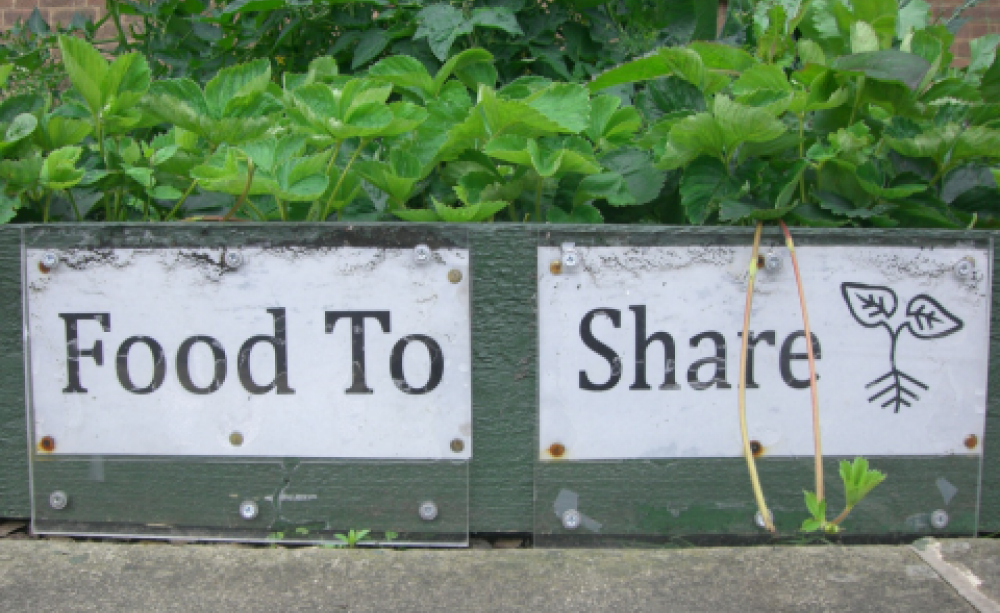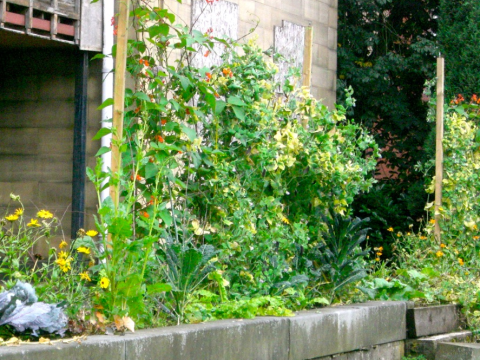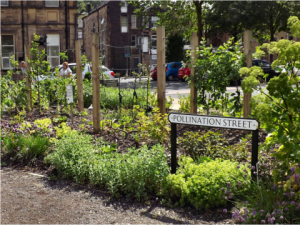Source: theecologist.org
Published: January 1, 2014

Todmorden in Yorkshire’s Calder Valley has been transformed by free food growing on its streets, parks and even its rooftops. Julian Dobson tells the inspiring story of Incredible Edible and how the transformational project is going global ….
Six years ago Mary Clear planted her front garden with vegetables and put up a notice.
“Grow your own”, it said. “Or share this stuff”.
Meanwhile Nick Green started filling neglected bits of public land with herbs and vegetables.
Mary and Nick’s ‘propaganda planting’ could have stopped there. They could have been like many other local growing projects that bloom in a burst of enthusiasm and turn into a grind.
‘Vegetable tourism’
Instead they’ve helped to turn Todmorden, at the far end of Yorkshire’s Calder Valley, into a town with a new sense of life and a magnet for ‘vegetable tourists’.
Much has been said and written about Incredible Edible Todmorden, to the extent that it has become a byword for local growing. And it has been extraordinarily successful in its colonisation of unusual spaces, from the front yard of the police station to the sides of the Rochdale Canal towpath.
Less has been written about why this really matters. What’s happening in Todmorden, and is now starting to spread to many other places, is the beginning of a survival strategy for towns and neighbourhoods in the 21st century.
It shows how we can bring together the huge global issues of resource constraints and environmental change with the quest for local empowerment and responsibility and a recreation of community.
A sense of place: a green route to urbanism
Todmorden got growing with some cheeky reuse of public space and a can-do attitude. As Pam Warhurst, Incredible Edible’s co-founder, put it: “We don’t ask permission. It takes too long and anyway we’re improving the place.” But there’s much more to it than chutzpah.
Walk around Todmorden now and you’ll find a new Green Route of walkways with edible and bee-friendly plantings, designed to bring a unity and identity to the town. It reconnects a town that had been split into three, divided by the Burnley, Rochdale and Halifax roads.
The route creates a pedestrian circuit from the railway station, along the canal, through the health centre with its fruit trees and ‘apothecary garden’, past the Hippodrome Theatre and back towards the market in the town centre – which is itself becoming a showcase for local produce.
This is destination management without the use of expensive consultants or the creation of endless strategies and official documents.
It’s local people deciding what kind of town they want to create and building an identity and reputation around that, starting with small actions and joining them up to create coherence.
Urban acupuncture
In the phrase coined by Jaime Lerner, mayor of Curitiba in Brazil, it’s “urban acupuncture” – small but carefully targeted interventions that make a big difference.
One reason why the actions of a small group of volunteers have made such an impact is that they have been highly visible, and that visibility has been infectious. Some of the earliest actions included herb planters on the railway station platforms and a garden just outside, so edible plants were the first thing visitors would notice.
An early example of propaganda planting was at the derelict Abraham Ormerod health centre where the serial killer GP, Harold Shipman, once worked. A place that passers-by used to avoid became remarkable. It was not long before the nearby community college and police station, both on the busy Burnley Road, had their own conspicuous raised beds too.

The ‘Shipman Clinic’, Todmorden, now a free food resource. Photo: Incredible Edible
The canal, which is popular both with boat users and walkers, is also a showcase for edible planting. The Canal and River Trust now welcomes planting beside towpaths, having seen what happened when local people went ahead and did it without asking.
By planting in strategic places and creating clear links between them, Incredible Edible Todmorden has turned what could be seen as random outbursts of enthusiasm into a form of organic planning, putting the town on the map by mapping the town.
And while Todmorden may have a head start, others are following and pioneering their own approaches to edible placemaking. There are now 50 Incredible Edible groups across the UK and around 300 in France. More are springing up all the time, from Montreal to Mali.
People worldwide are making connections and changing the way they think about food.
A sense of belonging: Building community together
Incredible Edible Todmorden has always worked from an understanding that people respond to simple shared ideas rather than heavy-handed persuasion. “If you eat, you’re in” is the motto.
Its members found that simply by planting, neighbours could start conversations. People would stop and ask why; some would join in and grow their own.
One family took vegetables from Mary’s propaganda garden and returned the next day with curry they’d made. At Ferney Lee old people’s home, boring lawns became full of raised beds with chard and rhubarb. Schools created gardens to teach children about horticulture.
Social landlord Pennine Housing caught the vision and saw an opportunity to benefit their tenants. They gave out free seeds and planters and offered money towards the cost of raised beds. They changed the rules so tenants could keep chickens.
They laid on cookery demonstrations and training courses to help bring home the message that home-grown veg is healthy, cheap and good for curious kids.
‘Real’ community development
This is community development without shortcuts and the imposed timescales of funding programmes. It happens conversation by conversation, engaging with people on their own terms and making them welcome.
Mary Clear calls it “the medicine of kindness”. It challenges current political narratives of “strivers and skivers” and “hardworking families” by insisting that everyone has something to offer and all work, not just paid work, is valuable.
In doing so it has much in common with asset-based community development, an approach that works from the positives in a place rather than treating it as a problem.
The shared language of food is uniting people across generations. The vision was for children to know how to feed themselves in the future; the knowledge those children needed resided with older people.
Incredible Edible Todmorden celebrates what is arguably the last great oral tradition in the developed world: the tradition of making food from seed and crop.
A sense of power: Changing the terms of debate
Growing vegetables and planting trees might seem a feeble response to the global threats of climate change and food insecurity, even if you’ve managed to create a thousand-strong orchard, as Incredible Edible Todmorden has. Nothing could be further from the truth.
By growing and sharing their own food, people are beginning to prise themselves away from global supply chains and build a degree of resilience, cushioning the impact of shortages or price rises.
By creating alternative routes to market for local producers, food growing projects can loosen the stranglehold of the big four supermarket chains, which between them sell three quarters of all groceries in the UK.
By learning horticulture and food preparation skills, individuals increase their self-esteem and ability to provide for themselves.
While alternative business models for food production are still in their infancy, there is enormous interest in growing food for personal consumption and for sharing.
Waiting lists for allotments have risen in recent years, and now stand at nearly 78,000 people across England – a total of 52 people waiting for every 100 plots provided by local authorities.
Meanwhile the need for cheap, healthy food has never been higher, with the numbers using emergency food banks tripling in the last year.

Pollination Street, Todmorden. Photo: Incredible Edible.
The value of Incredible Edible Todmorden and similar projects lies not only in building our ability to cope when the chickens of unconstrained consumption come home to roost. They also create the opportunity to manage and enjoy life now. That in turn reduces our vulnerability to shocks and challenges.
In the long run, there can be much more. Alternative terms of trade and exchange, from local currencies to time banks, can support local food networks and generate more equitable ways of doing business.
By preserving and propagating traditional and rare seeds and plant species, growers can decrease the risks of disease and reduce reliance on the few large companies that dominate the market.
By planting for biodiversity, it is possible to mitigate some of the effects of urban development and large-scale farming.
A sense of achievement: from small seeds to tasty towns
As Matthew Taylor, chief executive of the Royal Society of Arts, put it when he visited Todmorden a couple of years ago: “You have to act to hope.” Todmorden shows how such action can begin to change systems that once appeared immovable.
The town’s schools are one example. At Todmorden High School there is now a commercial-scale polytunnel that supplies the kitchen with fresh produce. A £750,000 aquaponics unit has just opened, secured with a £500,000 grant from the Big Lottery Fund and a donation of land from Calderdale Council.
It will produce fish, fruit and vegetables to be served in the canteen and used in food technology lessons. Any surplus will be sold.
Of course, not everyone strikes lucky with the lottery. But the tools that are changing Todmorden are freely available and in more and more places, people are starting to pick them up and explore how they can change the sense of place, the bonds within and between communities, and local resilience in the face of economic and environmental change.
Faith and imagination
The path to a tasty town doesn’t lie in following a secret recipe, but in having the faith and imagination to think that if you plant a seed it will grow, and if you plant enough of them, enough of them can grow to change everything.
This is why we’re now publishing the story of Incredible Edible. Written by Pam Warhurst with Joanna Dobson, it will explain why the Incredible Edible effect has caught on in so many places and how it can inspire a new wave of changemakers.
Julian Dobson is a writer, speaker and researcher and director of the consultancy Urban Pollinators Ltd. He previously founded and edited the community regeneration magazine, New Start.
Photos courtesy of Incredible Edible Todmorden.
